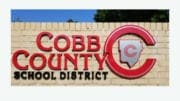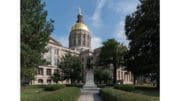by Madi Blair, Georgia Recorder [This article first appeared in the Georgia Recorder, republished with permission]
March 24, 2024
In schools and society, social media plays a dual role as information repository and forum for expression. That’s why the wholesale school social media ban that Georgia lawmakers are proposing is so dangerous. It’s a censorship multiplier. Senate Bill 351 would limit students’ access to forums for expression and their free speech rights under the First Amendment.
The legislation, labeled “Protecting Georgia’s Children on Social Media Act of 2024,” is one of several bills this legislative session aimed at regulating online activity. It is packaged as a tool to battle social media’s damaging effect on children’s mental and social health. But in the name of protecting students, the bill threatens to infringe on those very students’ constitutional rights.
Social media sites like X (formerly Twitter) contain a wealth of information on a wide range of topics, much like a library does. And like a town square, these sites are a vital space for public discussion and expression within a school’s student body and beyond.
Yet SB 351 would require every school district to adopt a social media policy that prohibits all social media access, not just on school devices but on school networks, including personal devices connected to those networks. The bill permits schools to use software or servers designed to block social media sites, but there is no limit to alternative ways districts might enforce the ban. Teachers, for example, could be required to personally review both school and personal devices for social media use, or schools could confiscate devices entirely.
The bill’s proposed blanket ban on social media access does more harm than good. U.S. Supreme Court precedent has established that students do not lose their First Amendment rights on school grounds. In Island Trees School District v. Pico, the Court rejected attempts by schools to censor school library books based on content, noting that students’ right to receive information “prepares [them] for active and effective participation in the pluralistic, often contentious society in which they will soon be adult members.”
And since the Court’s 1969 decision in Tinker v. Des Moines Independent Community School District, which rejected a high school’s attempt to stop students from protesting the Vietnam War by wearing black armbands, students have had a right to express themselves on school grounds so long as it does not cause substantial disruption to school operations.
Tinker’s disruption standard also extends to off-campus online activity. In Mahanoy Area School District v. B.L., the Supreme Court held that suspending a student from her cheer team because of her profanity-laced Snapchat post, made on a weekend, violated her First Amendment rights because it did not cause substantial disruption to the school.
Much of students’ academic lives occur online, driven by an increase in online learning activities and materials. A social media ban on schools, therefore, cuts students and classrooms off from resources in the virtual spaces where students are expected to learn. And while social media certainly has the potential to disrupt school operations, foreclosing its use entirely in every school in the state restrains students’ rights indiscriminately, regardless of whether or not there is a disruption.
That prohibition is a dangerous infringement on students’ constitutional rights. But SB 351’s problematic restrictions don’t end on school grounds, or even end with students. They extend from the school environment to students’ private lives, since many students use their school-issued devices at home.
The bill also regulates social media companies themselves, requiring sites like Instagram and Snapchat to verify users’ ages in a “commercially reasonable” manner. For users under 16, sites would only be able to provide them an account with “express consent” from a parent or guardian. According to the bill, such consent would be obtained via phone call, a form sent by mail or email, or by collecting parental driver’s license or credit card information. Age verification requirements are notoriously difficult to enforce, can easily be faked, and often create data privacy risks where personal information provided for age-verification purposes is then stored by the site. One similar age verification law has already been struck down in Arkansas. Another is currently being litigated in California.
“Protecting Georgia’s Children” is certainly a worthy cause, but SB 351 goes too far. The protection it purports comes at the expense of fundamental freedoms.
Georgia Recorder is part of States Newsroom, a nonprofit news network supported by grants and a coalition of donors as a 501c(3) public charity. Georgia Recorder maintains editorial independence. Contact Editor John McCosh for questions: info@georgiarecorder.com. Follow Georgia Recorder on Facebook and Twitter.





